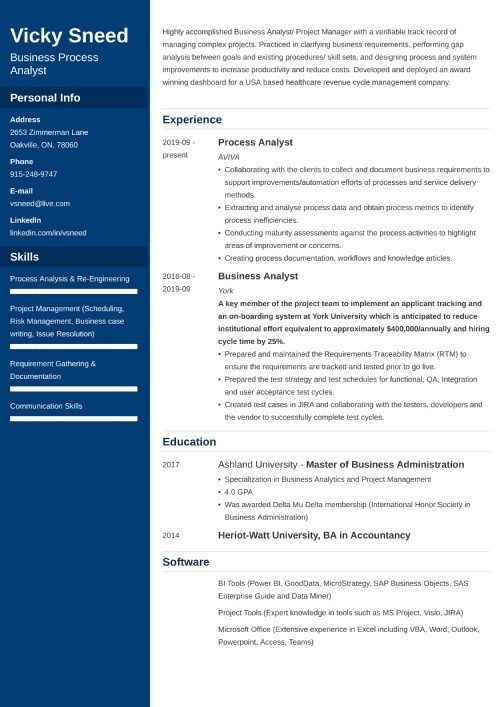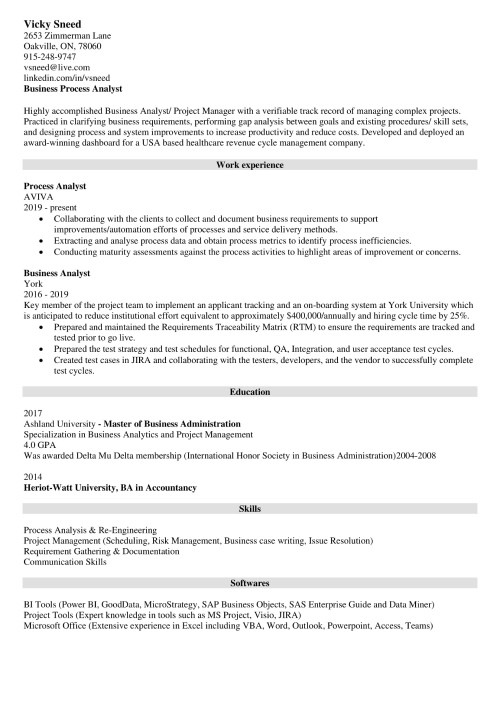You’re exactly where you need to understand what analytical skills are, why employers value them so much and—How you can develop your analytical thinking skills.
But that’s not all.
You’ll also learn how to nail them on your resume and in a job interview. Ready?
This article will show you:
- How to define analytical skills.
- Why employers value analytical skills and how they test them.
- What you can do to show your analytical thinking skills on your resume.
Want to save time and have your resume ready in 5 minutes? Try our resume builder. It’s fast and easy to use. Plus, you’ll get ready-made content to add with one click. See 20+ resume templates and create your resume here.
Sample resume made with our builder—See more resume examples here.
Want to read more about all kinds of skills you can put a resume? Try: The Best Job Skill Set to Put on a Resume
Looking for other career advice? Head straight to one of our guides:
- How to Make a Resume for a Job: Writing Guide
- 6 Tips on How to Tailor Your Resume to a Job Description
- Work Experience on a Resume: Job Description Bullet Points Samples
- Data Analyst Skills
1. What Are Analytical Skills?
Analytical skills are the abilities which allow you to collect, organize, visualize, and assimilate data. They let you see patterns, draw conclusions, and find solutions that can boost your employee productivity and company's bottom-line performance.
No surprise it’s very hard to find a job offer where analytical skills aren’t listed among the employer’s requirements.
It would be a bit of an understatement to say that analytical skills are the same as research or problem-solving skills.
Analytical skills consist of a set of abilities. That's why we’re talking about skills, not a single skill. They can be treated as an umbrella term for a set consisting of such skills as:
List of Analytical Skills
- Research
- Forecasting
- Problem-solving
- Data mining
- Data and metrics interpreting
- Reporting
- Organization
- Communication
- Diagnostics
- Troubleshooting
- Creativity
- Theorizing
- Brainstorming
In practice, your analytical skills can enable you to prepare a highly accurate sales forecast. This is more than solving a single problem.
In the next section we'll have a look at some hands-on examples.
Analytical skills are important but check out the analysis we made on the resumes created with our builder. We analyzed 11 million resumes and found out what are the top 10 most frequently added skills by our users:
- Teamwork and Collaboration
- Problem-solving
- Excellent Communication
- Multitasking
- Attention to Detail
- MS Office
- Analytical and Critical Thinking
- Data Entry
- Project Management
- Team Management
Want to find out more about other essential skills in the workplace? We’ve got you covered! Try our guides:
- Creative Thinking Skills
- Organizational Skills
- Time Management Skills
- Communication Skills
- Critical Thinking Skills
- Technical Skills
2. Examples of Analytical Skills in the Workplace
Analytical skills are welcome by employers from a wide variety of industries.
Why?
Because of their versatility.
Analytical skills are transferable and come in handy in lots of professional contexts. Take a look at the list of jobs that require analytical skills:
- Operations Research Analysts
- Market Research Analysts
- Budget Analysts
- Management Analysts and Consultants
- Economists
- Computer Network Architects
- Cost Estimators
- Chemists and Materials Scientists
- Software Developers
- Biochemists and Biophysicists
- Urban and Regional Planners
- Actuaries
- Financial Managers
- Insurance Underwriters
- Lawyers
In fact, the list could go on and on.
Thanks to new business models and rapid technological development, there appear more and more jobs where analytical skills are more than welcome.
Think of SEO, CRO, UI/UX, or product development positions in SaaS companies.
Analytical Skills—Example
Right—
At this point, you may feel like you can more or less define analytical skills.
But what do analytical skills mean in practice?
Here’s an example:
Say, one of your website’s landing pages has been underperforming in terms of sales. You’ve been tasked with identifying the problem and proposing a solution.
The task requires you to use at least a couple of your analytical skills and take several steps:
First, you might want to decide what data you’ll be looking at to make initial assumptions.
- How did the page perform historically in relation to other landing pages?
- Was there a moment in time when something changed?
- What does the structure of the page look like?
- What keywords is it centered around?
- What anchors are used to link to it?
Once you collect the relevant data, you might want to start putting it together to look for patterns and anomalies, theorize, prepare an action plan, and communicate it to your team leader.
If you have analytical skills, these are the things that might be expected of you at work.
Depending on your industry, experience, and expertise you may be asked to:
- Develop solutions with the use of statistical analysis, simulations or predictive modeling.
- Devise and evaluate methods for collecting data (e.g. surveys, questionnaires, or opinion polls).
- Review budget proposals for completeness, accuracy, and compliance with laws and other regulations.
- Conduct simplification and measurement studies to devise efficient and effective ways of operating.
- Select hardware and software to ensure stable and efficient support of the network.
Now—
Even though all these tasks come from various industries, they all require strong analytical skills to succeed.
There are many other examples of analytical skills:
- Synthesize large volumes of data
It’s not just about researching any data. You need to be able to identify what data is relevant and what is just random noise.
- Visualize and communicate your findings
Making sense of data is one thing, it’s equally important to be able to put your point across in a convincing manner.
- Compare available resources
Sometimes it all boils down to looking at pros and cons of available solutions and putting them in a larger context.
- Draw logical conclusions
At the end of the day, it doesn’t matter if you’re working with a data set or gain understanding through trial-and-error. Logical thinking is the basis of your success.
- Find solutions to problems
Even though your analytical skills can serve other purposes than problem-solving. Most of the time this will be the most practical application of them.
- Rationalize your choices
The choices you make must be understandable to your co-workers.
Analytical Skills Test
Listen:
No employer will take your word for it.
There are a number of ways in which your analytical skills can be tested:
- Pre-employment tests
These could be taken online or at the company location. Depending on the company and the position you’re applying for these could consist of numeracy questions, literacy questions, tasks where you need to put events in a logical series or look for inconsistencies.
- Assessment Centers
The tasks might involve training sessions which teach you some skills, which you’ll need to be able to use in practice to solve a problem. You may be asked to work in groups with other participants on case studies.
- Interview questions
The recruiter might want to learn about specific situations where you had to use your analytical skills in practice. More on this below.
Even though analytical skills testing can take on many forms, you can be sure of one thing—
They will test you. One way or another.
The good news?
We’re talking about skills. Not talents.
And skills you can learn.
Here’s how—
How to Improve Analytical Skills
There are a number of ways for you to improve your analytical skills:
- Teaching.
Yes, you got it right. To teach someone effectively, you need more than just a good grasp of the subject matter. You must be able to explain it in a clear way, see it from different perspectives, understand the challenges it poses, find patterns, analogies, rules, and exceptions. Teaching others will help you hone your analytical skills and see the world through other people’s eyes.
- Tests.
As simple as that. Practice makes perfect. There are a lot of resources available online both paid and free that can help you develop analytical and critical thinking skills. Have a go at a couple of tests to see what’s expected of you. You can start with this one, or this one.
- Become more observant of the world around you.
Ask questions, consider alternatives, don't take things for granted. No ideas on how to begin? Here's a fun one: when watching your favorite Netflix series look for plot holes and inconsistencies, talk to your friends about them, say what you'd have done differently in the protagonist’s place. It’s a simple and enjoyable way of improving analytical skills.
- Play logic games.
Chess. Sudoku. Einstein’s Riddle. Rubik’s Cube. XCOM2. You name it! Improving your analytical thinking skills doesn’t have to be boring.
3. Analytical Skills—Resume
If you want to impress your future employer with your analytical skills, there’s no better way of demonstrating them than on a carefully crafted resume.
In fact—
You can approach making your resume in a truly analytical manner.
Making a resume with our builder is incredibly simple. Follow our step-by-step guide, use ready-made content tailored to your job and have a resume ready in minutes.
When you’re done, Zety’s resume builder will score your resume and our ATS resume checker will tell you exactly how to make it better.
Analytical Skills on Resume
If there was only one word to describe the perfect resume, it would be:
Tailored.
Tailored to a specific job offer.
The same is true about the best skills for a resume.
They need to be tailored to a specific job.
Now—
You already know that there’s no single analytical skill, but a set of skills.
To convince the employer you’re the best candidate, you must show them you’ve got specifically what they’re looking for.
You can do it in two ways.
- Identify the keywords and use them on your resume.
Each job posting contains keywords that identify the analytical skills the employer is looking for by name. Here’s an example from a job opening for a business analyst position:
- Develop and maintain sales reports to provide actionable insights that support data-driven decision-making for the sales and executive leadership teams.
From the job description it’s clear the employer is looking for someone with:
- Data and metrics interpreting skills
- Reporting skills
Now, you can put these particular skills straight into your key skills section.
Your best bet is to go through the entire job posting and identify all the analytical skills sought after by the employer.
This way you’ll avoid overgeneralizing (e.g. putting analytical skills in your resume key skills section), and listing wrong skills (e.g. diagnostic skills) which are in fact among analytical skills, but not necessary for the role.
As you see, you don’t need any lists of analytical skills. What you do need, though, is to know what analytical skills to list on a resume.
Pro Tip: Putting the right keywords on a resume will not just help you nail the analytical skills in your key skills section, but also guarantee you getting past the ATS scanning stage.
- Put analytical skills as accomplishments on your resume.
Apart from listing the right analytical skills on your resume, you can actually demonstrate how proficient and effective you really are.
How?
By presenting your analytical skills as accomplishments on your resume. Again, let’s fall back on the business analyst job description bullet. There you are:
- Develop and maintain sales reports to provide actionable insights that support data-driven decision-making for the sales and executive leadership teams.
Here’s the secret.
If you happen to have any achievements that reflect your success performing a similar task, describe them using the language from the job ad, and quantify them like so:
- Developed and maintained sales analytics reports and dashboards that identified and effectively helped to eliminate major bottleneck generating 20% loss of revenue.
This way you’re not just listing a relevant analytical skill on a resume, but you’re giving a real-life example of how good you are at doing it.
And one more thing.
To up your chances, do both: fish out the relevant analytical skills and list them among your key skills and describe your best analytical skills in terms of achievements.
Here’s a little bonus for you. Learn how to describe your work experience in the most effective way: Work Experience on a Resume: Job Description Bullet Points Samples
Analytical Skills—Interview Questions
Last but not least.
Get ready for the job interview.
But be specific.
You know—
You can prepare for an interview “in general.” For example by giving yourself a pep talk in front of the mirror.
But that’s not enough.
The recruiter will want you to prove to them your resume is not a work of fiction, and your analytical skills are up to par.
The good news:
- You already know how to identify the analytical skills the employer looks for by looking for keywords in a job posting.
- You know how to use these keywords to your advantage by including the relevant analytical skills in your key skills list and by describing your skills in terms of achievements.
Now you need to learn how to talk about these skills using the so-called STAR method.
By the way, we have a great guide on STAR method interview questions that will help you ace any interview.
Here’s what you can expect in an interview.
The recruiter is particularly interested in your data and metrics interpreting skills as well as your reporting skills.
They may ask you something along the lines of “Tell me about a situation when your analytical skills made a difference.”
The question itself may be a bit misleading as the term analytical skills is broad.
But—
From the job offer you’ve learned which skills you need to focus on. And more than that, you’ve listed an achievement you can now elaborate on in more detail.
So, how to ace such a question?
Simple.
Tell the recruiter more about this:
- Developed and maintained sales analytics reports and dashboards that identified and effectively helped to eliminate major bottleneck generating 20% loss of revenue.
Just follow the STAR (Situation–Task–Action–Result) model:
- Situation: The employer wanted to develop analyses and reports to boost sales.
- Task: You were tasked with devising and implementing the reports and dashboards.
- Action: What steps you took to perform the task. What methods and technologies you used.
- Result: What was the result of your actions.
And this is how you can prepare your answers to analytical skills interview questions.
Let no interview question take you by surprise. Ever. Read our guides to learn how to breeze through your interview:
- Common Job Interview Questions & Answers
- 65+ Best Questions to Ask an Interviewer & Land Top Jobs [Proven Tips]
- 20 Situational Interview Questions and Answers to Nail Your Interview
Plus, a great cover letter that matches your resume will give you an advantage over other candidates. You can write it in our cover letter builder here. Here's what it may look like:
See more cover letter templates and start writing.
Key Takeaways
Here’s a summary of the most points about analytical skills:
- There's no single definition of analytical skills. Analytical skills consist of a set of skills that includes problem-solving, data skills, and creativity among others.
- There are a large number of jobs requiring analytical skills. Employers value analytical skills for their versatility and transferability.
- There are many analytical skills tests and interview questions to test analytical skills. The good thing is there are many ways to improve analytical skills.
- When looking for a job it’s crucial to identify what analytical skills the employer is after.
- Your resume needs to be tailored to put the right analytical skills in the spotlight.
- When preparing for a job interview, focus on the analytical skills you listed on your resume and learn how to talk about them using the STAR method.
About Zety’s Editorial Process
This article has been reviewed by our editorial team to make sure it follows Zety's editorial guidelines. We’re committed to sharing our expertise and giving you trustworthy career advice tailored to your needs. High-quality content is what brings over 40 million readers to our site every year. But we don't stop there. Our team conducts original research to understand the job market better, and we pride ourselves on being quoted by top universities and prime media outlets from around the world.





